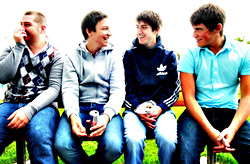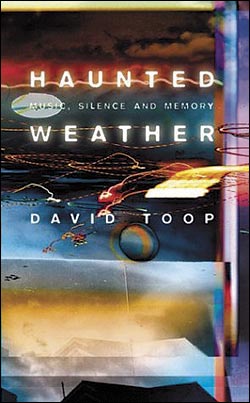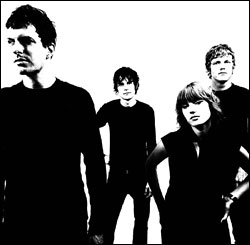I first saw David Byrne perform solo in 1980, opening for the Art Ensemble of Chicago and Philip Glass. Actually, “solo” isn’t exactly the right word—he conducted a string octet, for a total of six minutes. As I learned after the show, Byrne’s attenuated set wasn’t quite the Dada wink it seemed. Even then, he was investigating the rhythmic strategies of other cultures; with the exception of a ringer first violinist, the pickup band he’d assembled from local classical ensembles found his West African–influenced composition so hard to get their synapses around that they had to devote a week of rehearsal time to learning a single piece.
Byrne travels in more supple-minded company on Grown Backwards, his first release on Nonesuch: Percussion virtuoso and longtime collaborator Mauro Refosco, Austin’s relentlessly limpid Tosca’s Strings (who’ll be appearing at the Pier with him on Sunday), and Carla Bley’s band are all in the platoon of accompanists who help turn his droll ruminations into vibrating air molecules. Rufus Wainwright plays a slightly different role on the album, bolstering Byrne’s heroic braying on one of the album’s brief forays into opera: “Au Fond du Temple Saint,” from Georges Bizet’s The Pearl Fishers. It’s a good thing he’s along for the swim. Byrne, who manages the gentler “Un di Felice, Eterna” from Guiseppi Verdi’s La Traviata perfectly well on his own, isn’t used to singing loud and pretty at the same time; Wainwright’s lissome tenor provides added color and contrast, as well as welcome distraction from his colleague’s raggedy forte.
But even in the midst of the aforementioned misfire, Byrne’s feet seem bulletproof, simply because the man is so goddamn charming—a reverse Fred Rogers who always seems to be putting on his shoes and heading to someone else’s neighborhood. “The moon is risin’ like a discotheque/And now my bags are down and packed for traveling,” he announces in the first verse of album opener “Glass, Concrete, and Stone,” as he prepares to embark on the DB Express.
Like the album’s 11 other originals (Byrne rounds out his adventure in other people’s music theater with a cover of Lambchop’s “The Man Who Loved Beer”), “Glass” originated as a melody hummed ad hoc into a microcassette recorder, the quintessential travelin’ man’s gadget circa Remain in Light. If this departure from his usual song- cultivating modus operandi hadn’t given Grown Backwards its title, his lyrical point of view on “Glass” might have, except the album would have been called Reverse Aging. “Skin that covers me from head to toe/Except a couple tiny holes and openings,” he observes with the exuberance of one newly incarnated, adding “Everything’s possible when you’re an animal” a few lines later. He could be a baby squirrel, a resilient homeless person, simply himself, or some chimerical combination of the three. (Far be it from Mr. Inscrutable-Pants to fudge on ambiguity.)
While surprisingly fluid melody and lyrics that are all the more startling for the ordinary stuff of which they are made give “Glass”—and the rest of the album—its restless spirit, Byrne’s novel instrumental juxtapositions enflesh it. David Hilliard drives the song with a simple hi-hat part that works like a shaker pulse—the equivalent of four-on-the-floor dance music’s kick drum in much traditional African music. Refosco adds buoyancy and thrust with a marimba part that nudges Reichian pattern predilections toward the Palenque. Byrne’s nylon-stringed guitar and Jane Scarpantoni’s lambent cello, both abundantly European, give the song’s stark light and shadow a warm sepia tint.
So it is on the rest of the album: a little forro here, a little tropicalia there—and a whole lot of the wry eclecticism that threatens to make Byrne the Van Dyke Parks of his generation. There’s certainly nothing wrong with that, except that Byrne’d look awfully funny with a mustache. Plus, perennial detached observer Parks has always seemed a bit monkish, while several songs on Grown Backwards find Byrne addressing the topic of getting laid in a manner that calls for engagement. Chivalrously, he holds back for as long as possible, finally throwing his musical cock into the ring on the album’s bonus track: a deliciously Byzantine reworking of “Lazy,” X-Press 2’s Byrne-sung club smash from 2002. Byrne even makes good on the chorus’ “I’m wicked and I’m lazy” claim by letting Tosca do most of the work on the song, which leans far more heavily toward Fonda Rae’s “Deputy of Love” than anything his old band ever did—until the end. At long last—after the string interludes, percussion breakdowns, and a Princely near monologue—just when the song would normally be ending, a guitar leaps into the foreground and stays there: brittle, distorted, and funky enough to make !!!’s entire output seem like cheese food that’s been sitting out since Byrne’s 1980 fake Nigerian mishap.
The strangest thing about that show was Byrne’s exit. He hung out in front of the venue for a good long while, talking to fans and looking around in that preternaturally alert way of his (it’s good to be an animal!), and then turned a corner and just started walking up the street—alone—like no rock star I’ve ever seen before or since. The intersection in question is only a few blocks from my building; every now and then when I find myself standing there, I imagine him approaching from the opposite direction. It used to seem like a silly notion, until I heard the guitar on “Lazy” and realized that 24 years ago and the present probably exist simultaneously in Byrne’s head, like Ziegfeld dancers rotating in complementary circles. Then I noticed that “Glass, Concrete, and Stone” and “Lazy” have exactly the same tempo, making Grown Backwards an extremely rich, 58-minute, four-second loop. Fuck it. I’m not about to give up now.
David Byrne plays Pier 62/63 with Tosca Strings at 7 p.m. Sun., Aug. 15. $32.








